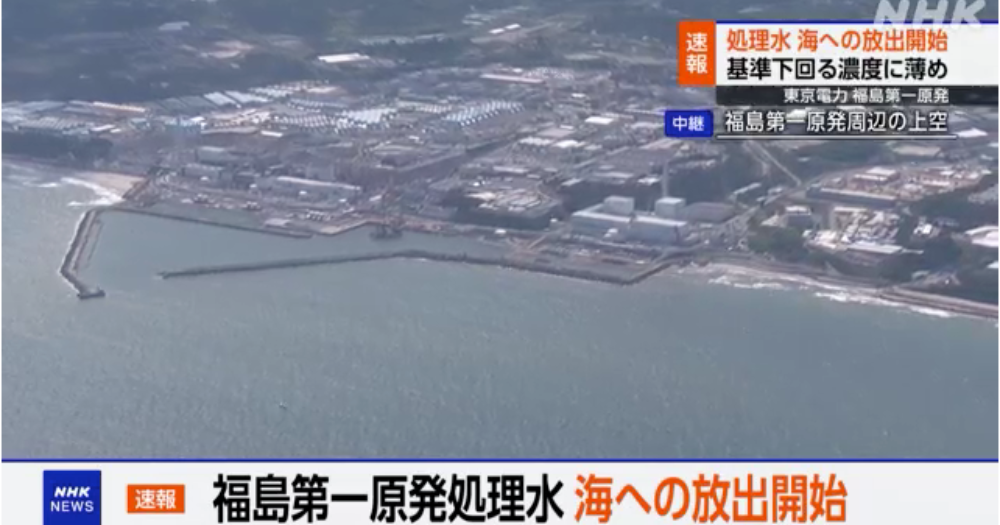The Tokyo Electric Power Company (TEPCO) began releasing nuclear wastewater containing radioactive elements into the Pacific Ocean at around 1pm today (Aug. 24), reported Japanese news outlet NHK.
Previously, TEPCO's Fukushima Daiichi nuclear power plant had been accumulating the wastewater used to cool down the fuel cores at the plant in storage tanks since Japan's eastern coast was hit by the earthquake and tsunami in 2011.
It is estimated that the entire discharging process would take around 30 years to complete, as the generation of wastewater has never stopped and the significant amount of wastewater could not be released into the ocean at once, according to NHK.
Wastewater storage space was almost full
At a ministerial meeting on Aug. 22, Japanese prime minister Fumio Kishida announced that the government would start releasing the wastewater into the sea two days later after diluting it to concentrations below national and international standards, reported NHK.
This decision came after the total volume of wastewater stored at the Fukushima Daiichi nuclear power plant had reached 1.34 million tonnes, accounting for 98 per cent of its tank capacity.
In January 2023, the Japanese government announced that it would postpone its plan to release the wastewater into the sea to sometime between the spring and summer of 2023 because it was waiting for a "comprehensive report" from the International Atomic Energy Agency (IAEA).
The IAEA is an autonomous international organisation within the United Nations. The agency works with its member states and partners worldwide to promote "the safe, secure, and peaceful use of nuclear technologies", according to the agency's website.
Six months later, the Japanese government received the green light from the IAEA for its release plan, which was deemed by the IAEA as "consistent with international safety standards" and would have "a negligible radiological impact on the people and the environment".
Details of the release
Following the Japanese government's announcement, TEPCO began preparing for the release by mixing the wastewater with a large amount of seawater and conducting an analysis of its tritium concentration, a radioactive substance that TEPCO's Advanced Liquid Processing System wasn't able to remove.
The results showed that the tritium concentration was 43 to 63 becquerels per litre, which was significantly lower than Japan's national standard at 60,000 becquerels per litre, and the country's self-imposed release standard of 1,500 becquerels per litre.
After the wastewater has been diluted, TEPCO proceeded to release the wastewater into the sea earlier today at 1:03pm.
The initial release involved diluting 7,800 tonnes of wastewater with seawater and was scheduled to last for a period of 17 days.
The total amount of wastewater to be released this year was estimated to be around 31,200 tonnes.
Response from neighbouring countries
China's response
Shortly after the release, the General Administration of Customs of the People's Republic of China announced that all imports of seafood originating from Japan would be halted until further notice.
At a press conference on Aug. 24, China's Foreign Ministry spokesperson Wang Wenbin said that China "strongly" objected and condemned Japan's decision to release the wastewater into the sea unilaterally, disregarding the doubts and objections raised by the international community:
"The Japanese government has not demonstrated the legitimacy or the legality of its decision to release the nuclear wastewater. It has also failed to prove the long-term reliability of its nuclear wastewater purification system.
Furthermore, it has yet to prove the accuracy of its data revolving the nuclear wastewater, nor has it demonstrate that discharging the wastewater into the ocean will not endanger the marine environment or the well-being of the people.
Finally, the Japanese government has not demonstrated the comprehensiveness and effectiveness of the monitoring plans, nor has it engaged in sufficient consultation with the relevant stakeholders.
The ocean is a shared resource for all humanity. Japan's decision to proceed with the release of the wastewater is extremely selfish and irresponsible, and it disregarded the international public interests".
At the end of the statement, Wang also stressed that the Chinese government would take "all necessary measures" to uphold food safety and protect the health of the Chinese people.
Korea's response
In contrast, in a statement to the nation 30 minutes after Japan began releasing the wastewater into the sea, South Korean prime minister Han Duck-soo urged his fellow citizens not to be "overly worried" about the release if it is carried out "according to scientific standards and international procedures".
He emphasised that what threatened the people the most were "false news not based on science and deceptive provocations for political interests," and entities should not confuse the public with "incorrect information".
Han also promised that the South Korean government would monitor the situation thoroughly while implementing various support measures to protect the fishing industry simultaneously.
Additionally, the restrictions placed on Japanese seafood imports would remain, said the prime minister.
You can also watch our video on Japan's nuclear wastewater here
@mothershipsg Is Japan's treated radioactive water safe?? 🌊#tiktoksg #japan #seafood ♬ original sound - Mothership
Top image via NHK
If you like what you read, follow us on Facebook, Instagram, Twitter and Telegram to get the latest updates.



